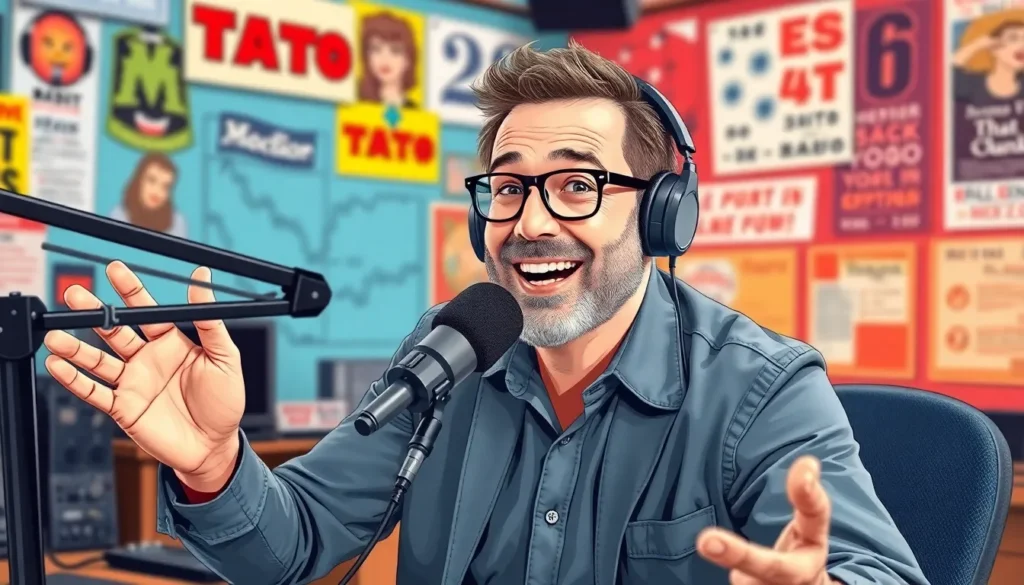Daytime talk shows have become a staple of American culture, serving up a delightful mix of entertainment, gossip, and heartfelt moments. From celebrity interviews to viral challenges, these shows offer a daily escape that keeps viewers coming back for more. Whether it’s a laugh-out-loud skit or a tear-jerking story, there’s something for everyone in this vibrant world of daytime television.
As the landscape evolves, new hosts and formats emerge, keeping audiences on their toes. With a dash of humor and a sprinkle of drama, current daytime talk shows are not just about the latest trends; they’re about connecting with viewers in a way that feels personal. So grab your coffee and settle in, because the current lineup is packed with surprises that promise to brighten even the dullest of afternoons.
Current Daytime Talk Shows
Current daytime talk shows play a vital role in American television, blending entertainment, celebrity gossip, and heartfelt conversations. Popular shows like “The Ellen DeGeneres Show,” “The Talk,” and “The Kelly Clarkson Show” provide diverse formats to engage audiences. Each program features a unique style, shaping the viewing experience for millions.
Hosts bring their personalities to the forefront, creating relatable interactions with guests and viewers alike. Talent shows often highlight remarkable individuals, while heartfelt stories encourage viewer connection. Celebrities frequently guest star, discussing projects and sharing personal anecdotes, adding depth to the content.
Evolving segment formats keep audiences intrigued. Game segments, musical performances, and philanthropic initiatives offer variety. Shows also address current hot topics, effectively reflecting social issues and trends. Engaging online components enhance viewer participation and discussion.
Different networks produce specific programming, targeting various demographics and interests. NBC, ABC, and CBS have crafted iconic talk shows, each contributing to the overall landscape of daytime television. This broad offering caters to diverse audiences, creating a shared experience for viewers across the nation.
Daytime talk shows maintain relevance through adaptation and innovation. Regular updates to content and hosting styles align with audience preferences. Engaging discussions combined with entertainment ensure continued loyalty from viewers. As fresh concepts arise, they promise to reshape how daytime talk shows engage with their audiences.
Popular Hosts and Their Styles

Current daytime talk shows feature hosts with distinct styles that resonate with viewers. Each host’s unique approach shapes the show’s tone and content.
Charismatic Interview Techniques
Hosts like Kelly Clarkson and Ellen DeGeneres excel at making guests feel at ease. Clarkson employs warmth and humor, leading to candid discussions. DeGeneres often blends personal anecdotes with questions, creating an atmosphere of intimacy. Such techniques encourage guests to share personal stories, resulting in relatable moments. Her ability to connect with high-profile guests has proven effective in drawing audiences in. Hosts maintain a genuine curiosity, allowing authentic conversations that keep viewers engaged.
Engaging Audience Participation
Audience interaction enhances the enjoyment of daytime talk shows. Shows like “The Talk” incorporate live audiences, fostering a community feel. Hosts often invite audience members to ask questions or share their experiences, making them feel included. Techniques include audience contests and giveaways, providing entertainment that encourages participation. Viewers at home also interact via social media, contributing to discussions and sharing their thoughts. This engagement builds a sense of connection that extends beyond the broadcast.
Trends in Content and Format
Current daytime talk shows emphasize engaging content and innovative formats. Hosts utilize their unique styles to create a personal connection with viewers.
Celebrity Interviews and Guest Appearances
Celebrity interviews dominate daytime talk shows, offering viewers exclusive insights into the lives of their favorite stars. Popular hosts like Kelly Clarkson and Ellen DeGeneres excel at fostering genuine conversations, making guests feel comfortable and open. Through these candid discussions, audiences gain a deeper understanding of public figures while enjoying entertaining anecdotes. Often, guests participate in fun segments that showcase their personalities beyond their public personas. This mix of light-heartedness and authenticity enhances the appeal of each episode, ensuring that viewers return day after day.
Social Media Integration
Social media integration has revolutionized viewer engagement in daytime talk shows. Hosts encourage real-time interactions through platforms like Twitter and Instagram, allowing audiences to voice opinions and ask questions. This two-way communication builds a sense of community, making viewers feel included in the broadcast. Often, online comments and questions influence show content, prompting meaningful discussions on relevant topics. Additionally, highlights and clips shared across social media platforms expand reach and attract new audiences. This innovative approach ensures that daytime talk shows maintain a strong connection with both live viewers and those engaging online.
Impact on Pop Culture
Current daytime talk shows significantly shape pop culture by influencing public discourse and shaping perspectives. They spark conversations about diverse topics, from celebrity behavior to societal values. Hosts often focus on relatable themes, making the issues relevant to everyday life. Trends popularized on these shows frequently ripple through social media, guiding viewer opinions and fostering conversations beyond the broadcast.
Influence on Public Opinion
Influencing public sentiment, daytime talk shows serve as a barometer for mainstream beliefs. They facilitate discussions that sway audience perceptions, especially during critical events. Celebrities and experts share viewpoints, and viewers connect with these opinions on a personal level. Examples include conversations around mental health and body positivity that resonate deeply with audiences. By addressing current affairs through interviews and personal stories, these shows shape how people view societal norms and challenges.
Contributions to Social Issues
Daytime talk shows contribute to conversations on vital social issues by raising awareness and promoting activism. They often spotlight charitable initiatives and highlight causes like racial equality, women’s rights, and mental health awareness. Regular segments provide platforms for discussion, encouraging viewers to engage with these pressing topics. For instance, programs frequently invite guests who have personal experiences related to social issues, fostering authentic dialogue. Such content not only educates viewers but also prompts community involvement and action, creating a ripple effect in broader society.
Future of Daytime Talk Shows
The future of daytime talk shows appears dynamic, marked by evolving formats and audience expectations. Many host personalities are exploring fresh content themes, responding to shifting cultural trends. Integration of technology plays a crucial role, as interactive platforms enhance viewer engagement through real-time participation.
Popular networks are investing in diverse programming, aiming to reach broader demographics. Potential collaborations between hosts and celebrities create unique segment opportunities that attract viewers. Holistic approaches to topics such as mental health and social justice might resonate even more with audiences in upcoming seasons.
Fostering genuine conversations remains a focus, with tighter connections encouraged between hosts and guests. Conversational styles are evolving, making discussions feel more spontaneous and relatable. Audience participation through social media influences topic selection, ensuring that viewers’ voices contribute to the show’s content.
Current trends indicate that shows emphasizing inclusivity and authenticity capture audience interest. Innovative storytelling techniques can amplify emotional connections, keeping viewers engaged throughout the episode. Newer formats, like hybrid live-virtual segments, may redefine how shows interact with audiences.
There’s an emphasis on adaptability in response to societal changes, positioning daytime talk shows as platforms for meaningful dialogue. Future hosts might prioritize authenticity, with personal anecdotes that resonate beyond celebrity culture. Continuous assessment of audience feedback will guide production teams in crafting relevant, engaging segments.
Ultimately, the trajectory for daytime talk shows remains promising, driven by their ability to innovate while maintaining the core values of connection and engagement.
Conclusion
Current daytime talk shows continue to thrive by blending entertainment and meaningful dialogue. Their ability to adapt to cultural shifts while fostering genuine connections keeps audiences engaged. With hosts who bring authenticity and charisma to the screen these shows create a welcoming atmosphere for both guests and viewers.
As they tackle pressing social issues and highlight diverse perspectives daytime talk shows remain influential in shaping public discourse. The integration of social media further enhances viewer participation making audiences feel like part of the conversation. This evolving landscape promises a bright future for daytime talk shows as they strive to meet the needs and interests of their viewers.



